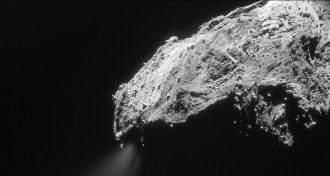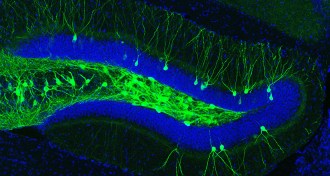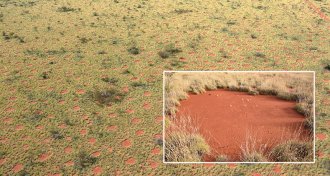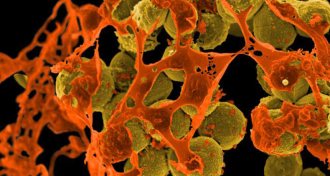News
-
 Planetary Science
Planetary ScienceComets carried noble gases to Earth
Asteroids might have delivered water to Earth, but comets could be responsible for noble gases and amino acids, a new study suggests.
-
 Math
MathMathematicians find a peculiar pattern in primes
Consecutive prime numbers don’t behave as randomly as mathematicians assumed.
-
 Humans
HumansPacific islanders got a double whammy of Stone Age DNA
Neandertal and Denisovan genes influence the health of present-day Melanesians.
By Bruce Bower -
 Neuroscience
NeuroscienceLost memories retrieved for mice with signs of Alzheimer’s
Using light, scientists coaxed a forgotten memory from the brains of mice with Alzheimer’s-like symptoms.
-
 Materials Science
Materials SciencePlaying with building blocks for metamaterial design
Legos show promise as a low-cost method to assist scientists in developing novel metamaterials.
-
 Ecosystems
EcosystemsAustralian fairy circles first to be found outside Africa
Strange patterns of grassland bald spots called fairy circles show up in Western Australia.
By Susan Milius -
 Planetary Science
Planetary ScienceWandering Jupiter could have swept inner solar system clean
If Jupiter formed close to the sun and then wandered out, that might explain why there are no planets interior to Mercury’s orbit.
-
 Paleontology
PaleontologyNew tyrannosaur bridges gap from medium to monstrous
Horse-sized Timurlengia euotica had a brain and ears like its bigger relative Tyrannosaurus rex, which lived millions of years later.
By Beth Geiger -
 Anthropology
AnthropologyAncient DNA reveals who is in Spain’s ‘pit of bones’ cave
Ancient DNA shows Neandertals lived in northern Spain 430,000 years ago; the early date raises new questions about Neandertals’ origins.
By Bruce Bower -
 Climate
ClimateAntarctic history suggests ice sheet ‘danger’ threshold
Carbon dioxide levels during the Antarctic ice sheet’s formation 34 million years ago suggest that Earth could soon enter “danger zone” for ice sheet’s demise.
-
 Plants
PlantsHow to keep seagrasses as happy as a clam
Drought can do more damage to seagrass meadows if their partnership with clams break down.
By Susan Milius -
 Health & Medicine
Health & MedicineMolecules found to counter antibiotic resistance
Molecules made in a lab can foil antibiotic resistance in bacteria.